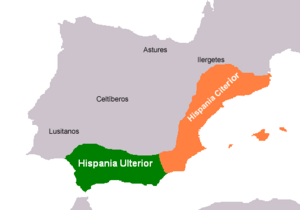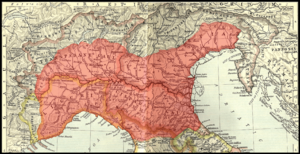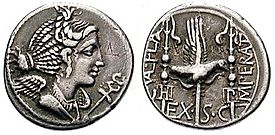Gaius Valerius Flaccus (consul 93 BC) facts for kids
Quick facts for kids
Gaius Valerius Flaccus
|
|
|---|---|
| Consul of the Roman Republic | |
| In office January 93 BC – December 93 BC Serving with Marcus Herennius
|
|
| Preceded by | Gaius Coelius Caldus and Lucius Domitius Ahenobarbus |
| Succeeded by | Gaius Claudius Pulcher and Marcus Perperna |
| Personal details | |
| Born | Unknown |
| Died | Unknown |
| Military service | |
| Allegiance | |
| Commands | Governor of Asia Governor of Hispania Citerior Governor of Hispania Ulterior Governor of Gallia Cisalpina Governor of Gallia Transalpina |
Gaius Valerius Flaccus was an important Roman leader, general, and politician who lived in the early 1st century BC. He served as a consul (a top leader) of the Roman Republic in 93 BC. He also worked as a governor in different Roman regions for many years.
Gaius Valerius Flaccus is known for trying to stay neutral during the big Sullan civil wars. He also governed his regions for a very long time. He worked hard to give citizenship to people who were not originally Roman.
He held many important government jobs when he was younger. These jobs led him to become a consul, which was the highest civil position in Rome. In 92 BC, he became governor of one or both Roman provinces in Hispania (modern-day Spain). He had to deal with a difficult uprising there. He managed to stop the fighting and governed the area for a long time. He was very careful to follow all legal rules. Later, in the 80s BC, Flaccus became governor of Gallia Transalpina (southern France). He might have also governed Gallia Cisalpina (northern Italy) at the same time. We don't know if he was still governing Hispania then.
Flaccus tried to stay out of the conflicts between the groups led by Marius and Cinna and the group led by Sulla. But then his brother, Lucius Flaccus, was killed by a supporter of Marius and Cinna. After this, Gaius Valerius Flaccus started to support Sulla, but he did not openly declare it. Sulla won the civil war in 82 BC. Flaccus was then allowed to celebrate a triumph (a special parade for military victories) under Sulla's rule.
Contents
Becoming a Roman Leader
Gaius Valerius Flaccus held the position of praetor (an important judge and administrator) before 95 BC, probably in 96 BC. An old stone carving found in Claros (in modern Turkey) shows that after being a praetor, he had a senior military role in the Roman province of Asia. Both he and his brother, Lucius, were honored as patrons (supporters or protectors) of the city of Colophon. They were the first Roman governors known to be called patrons of a free city. This became a common practice later on.
Flaccus might have tried to become consul in 94 BC but lost. It was common for someone who lost an election to try again the next year. Flaccus did this and was successfully elected as a consul in 93 BC. His fellow consul was Marcus Herennius.
Helping People Become Citizens
In 96 BC, while he was a praetor in Rome, Flaccus helped pass a law to give citizenship to Calliphana of Velia, a priestess. Julius Caesar also wrote that Flaccus gave citizenship to a Celt named Caburus when he was governor of Gallia Transalpina. Caburus took Flaccus's family name, Gaius Valerius, as was the custom.
Flaccus's interest in giving more people citizenship shows that his family believed in helping ordinary people. They were known for supporting "new men" and families who were not from the traditional Roman noble class.
Governing Hispania
In 92 BC, Flaccus became the new governor of Hispania Citerior, a Roman province in northeastern Spain. He took over from Titus Didius because there was an uprising among the Celtiberi, a major local group. The historian Appian wrote that the revolt started because Didius had been very cruel. Didius had tricked many poor Celtiberians by promising them land, then trapped and killed them all.
Flaccus tried to bring peace back to the region. He fought battles where about 20,000 Celtiberi died. In one city, Belgida, the local leaders refused to declare war on Rome. Rebels then set fire to their building and burned the leaders alive. Flaccus likely stopped the large-scale violence by punishing those responsible for this terrible act.
Flaccus stayed in Hispania as governor longer than any other Roman governor before him. He seems to have been in charge of both Hispania Ulterior and Citerior. His long time in power was probably because of the Social War and the civil wars that followed in the 80s BC. After making the region stable, Flaccus governed wisely and respected the laws.
Water Rights Dispute
Flaccus was still governor in Hispania until at least 87 BC. We know this from a bronze tablet called the Tabula Contrebiensis. This tablet has his laws written on it about land boundaries and water rights. The document is in Latin and follows Roman legal rules. However, the judges were the local leaders of Contrebia Balaisca (near modern-day Botorrita). Flaccus helped solve the problem by using Roman legal ideas in a way that worked with the local Celtiberian laws.
Governing Gaul
At some point in the 80s BC, Flaccus was made governor of Gallia Transalpina (Transalpine Gaul). This was a Roman province in southern France. The other Gallic province was Gallia Cisalpina (Cisalpine Gaul), which was northern Italy. These two provinces were often governed together. Since no other governor is recorded for Cisalpina between 87 and 82 BC, Flaccus might have governed both at the same time.
It's not clear if Flaccus governed Hispania and Gaul at the same time, or if he moved from one to the other. By 85 BC, Flaccus was definitely in charge of Transalpina. He was called imperator (a military title for a victorious general). He kept his province until he celebrated a triumph over Celtiberia and Gaul in 81 BC. Some historians believe he might have been in charge of all four provinces (both Hispanias and both Gauls) by the mid-80s BC.
Flaccus's very long time as governor shows that it was not always unusual for Roman leaders to hold power for many years. For example, Julius Caesar later governed Gaul for a long time, and Pompeius Magnus and Marcus Crassus also had long commands.
The Quinctius Case
In 83 BC, Flaccus was involved in a property dispute. It was between Publius Quinctius and Naevius. Quinctius had inherited land in Transalpina from his brother, along with some debts. Naevius, who had been the brother's business partner, tried to take the property. Flaccus decided that Naevius had taken the property wrongly and ordered him to give it back.
Two years later, the case was still going on. This case helped start the career of Cicero, who was a young lawyer in his mid-twenties. In 81 BC, Cicero argued for Quinctius. His speech, pro Quinctio, still exists today.
Role in the Civil War
If Flaccus governed both Hispanias and both Gauls, he would have had a very large army. The loyalty of these armies was very important for Rome. Until 85 BC or later, Flaccus either supported or did not act against the interests of the groups led by Marius and Cinna. These groups controlled the consulship from 87 to 82 BC. Flaccus seemed to be trying to keep order while staying neutral in the conflict. However, his family usually supported the populares (a group that favored ordinary people) and had strong ties to Marius.
A turning point came when Flaccus's brother, Lucius, died. Lucius Valerius Flaccus had become consul after Marius died in 86 BC. He was sent as governor to the Roman province of Asia. In 85 BC, he was murdered by a rebellious soldier named Gaius Flavius Fimbria. Fimbria then took command of Lucius's troops. The government led by Cinna did not punish Fimbria, who was a strong supporter of Marius. Lucius's son, also named Lucius, escaped Asia and found safety with his uncle, Gaius Valerius Flaccus, in Massalia (modern-day Marseille). This nephew was the Lucius Valerius Flaccus whom Cicero later defended in his speech Pro Flacco.
No new governor was sent from Rome to replace Flaccus. But people might have started to doubt his loyalty. Cinna was killed in 84 BC. Sulla returned to Italy in 83 BC, captured Rome, and declared himself dictator. The Marian-Cinnan group, now led by Marius's son, tried to secure Hispania. Flaccus, with his large command, was likely managing Hispania through his legates (high-ranking military officers). It was dangerous for the Marian government if the armies in Hispania joined Sulla.
When the young Marcus Crassus (who would later be a very powerful leader) raised Spanish troops for Sulla in 84 BC, Flaccus did nothing to stop him. Quintus Sertorius, who was very loyal to the anti-Sullan cause, was sent to Spain in late 83 or early 82 BC. Flaccus allowed Sertorius to march through Transalpina, and Sertorius also did not act against Flaccus's authority. The Marians might have wanted to protect their interests in the west without forcing Flaccus to pick a side. It was also reasonable to replace Flaccus after such a long time as governor.
No ancient writings say that Flaccus was a strong supporter of Sulla. But the governor could have shown his disapproval by not sending tax money to Rome. Flaccus only clearly leaned towards Sulla after Sulla gained control of Cisalpine Gaul. Flaccus's cousin, also named Lucius Valerius Flaccus, might have influenced Gaius to support Sulla. This cousin helped pass the Lex Valeria, the law that made Sulla dictator in late 82 or early 81 BC. Flaccus celebrated his triumph under Sulla's dictatorship. Sulla would not have allowed this honor if Flaccus had not supported him. Flaccus was in his mid-50s or older at this time.
Roman Coins
After Sulla won the civil war, the Roman senate allowed Flaccus to make his own coins. These coins helped pay for his army during his last months as governor. Many of these coins still exist today. In 82 BC, to celebrate his victories, a mint in Massalia made a denarius coin. One side showed a winged image of Victory (the goddess of victory) and a caduceus (a symbol of peace and trade). The other side showed a Roman legionary aquila (an eagle standard) with military standards on each side. The left standard had an H (for Hastati, a type of soldier), and the right had a P (for Principes, another type of soldier). Below them, it said EX.S.C, meaning "by decree of the senate." On the left, it said C.VAL.FLA for Gaius Valerius Flaccus, and on the right, IMPERAT for imperator (victorious general). Flaccus's coin was similar to coins Sulla made. Coins made in Hispania and Gaul during this time often showed "legitimacy and military success." It is thought that about 540,000 of these denarii coins were made.
Images for kids
See also
 In Spanish: Cayo Valerio Flaco para niños
In Spanish: Cayo Valerio Flaco para niños
 | Madam C. J. Walker |
 | Janet Emerson Bashen |
 | Annie Turnbo Malone |
 | Maggie L. Walker |





